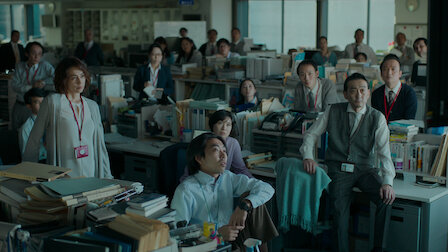Government corruption scandals and investigative journalism may not be everyone’s cup of tea, and it certainly may seem boring to those who are disinterested in politics, but all of the above become interesting in Netflix’s new Japanese thriller “The Journalist.” Released on Jan. 13, it is the drama version of the 2019 film of the same name, which won three Japanese Academy Prizes. With a brand new cast and story, the show does not disappoint with its presentation of seemingly dry topics such as political corruption and news reporters in an interesting way through realistic character building and dilemmas.
“The Journalist” is centered around a case of corruption in the government, where land was sold at a cheap price in a deal with the prime minister and the first lady. The so-called “Eishin Academy Case” is assigned to reporter Anna Matsuda (Ryoko Yonekura), whose sharp questioning style and dedication to uncovering scandals has become infamous to politicians. In the meantime, the first lady’s assistant Shinichi Murakami (Gō Ayano) is reassigned to the Cabinet Intelligence Office to keep a low profile as his superiors attempt to cover up the scandal. A top secret meeting took place in Nagoya, where Kazuya Suzuki (Hidetaka Yoshioka) and his colleagues at the local finance bureau are instructed to revise the paperwork to match the prime minister’s insistence that he and his wife are not involved in the Eishin Academy deal. When the situation worsens, Suzuki’s nephew Ryo Kinoshita (Ryusei Yokohama), who is disinterested in the news despite being a newspaper delivery man, realizes that the world of politics affects ordinary people like him, too.
For those who are interested in politics and investigating corruption, this show is perfect: it shows how various parties are involved in and affected by a political scandal and how various forces work to either cover things up or unveil the truth. At the same time, it tackles other important issues, such as the younger generation’s general disinterest in current affairs and obstacles in the way of job hunting.

For those who never thought they would take any interest in such matters, “The Journalist” presents itself in a way that even those who are unfamiliar with the Japanese government can enjoy the suspense and mystery it has to offer, enhanced through the soundtrack by Taro Iwashiro. Although the show is only six episodes long, it does not feel too long or short, and thanks to its good pacing, there is enough time to let the truth unfold before viewers’ eyes.
Viewers can find themselves relating to at least one of the characters, whether it’s the student who believes that the higher-ups determine the rules and ordinary citizens have nothing to do with it, the journalist who fights for her sense of justice, the worker who is forced to do something he does not want to by the fear of losing his job or the man being tormented by his guilt and knowledge of his own wrongdoings. They are worth rooting for because they are relatable, and even without prior knowledge regarding political power dynamics, viewers can find themselves cheering for the main characters because they represent a justice that is universal.
Although the show is in Japanese, it presents the stakes clearly so that anyone could understand them; it’s a surprisingly simple show about ordinary people, whose mental and physical health have been deteriorating due to injustice. The show does not build unbelievable melodrama or forced conflicts; instead, it conveys a simple message of speaking up against injustice. It is everyone’s responsibility to fight for what they believe is right, and “The Journalist” states its core message through its titular character Matsuda: “it is the job of a journalist to give a voice to the voiceless.” This message, much like many of the series’ core ideas, transcends borders and gives meaning to the show’s title. Aside from being the main character, the journalist is a symbol representing a search for the truth and the importance of speaking that truth loud and proud. Matsuda’s words are inspiring, and through this line alone, it is easy to see why she worked so hard as a journalist.

Released in 2022 with a story set in 2019, “The Journalist” offers many references to the COVID-19 pandemic, keeping up with an important aspect of journalism: timeliness. The latter episodes include issues that arose out of the pandemic that viewers are painfully aware of, including graduation being canceled, job offers being withdrawn and a general fear of what was to happen in the future. The show takes these problems and works them into a story in a natural way that makes it relevant and relatable.
As journalists, many were bound to encounter stories of great injustice or unfair representation; it is up to them to amplify the voices of the oppressed and let the world hear what they had to say. “The Journalist” creates suspense and an interesting mystery surrounding a stereotypically dry topic by utilizing realism to warm the hearts of even those who are detached from political debates.
Grace Tu is an Entertainment Staff Writer. She can be reached at tug2@uci.edu.

